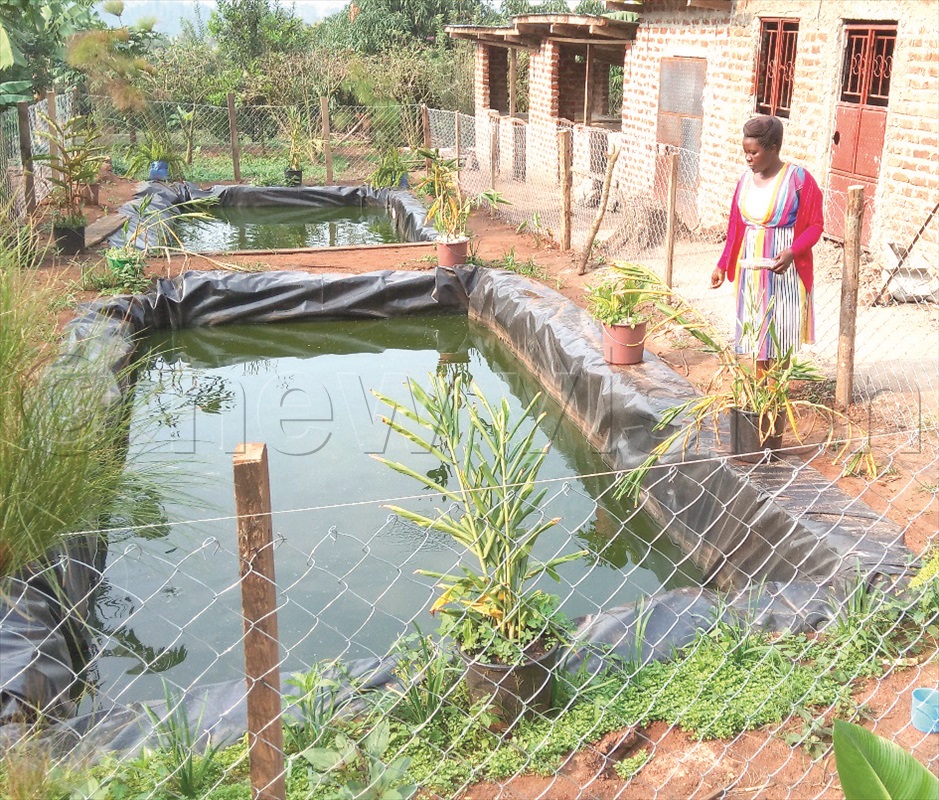By Joshua Kato
Bigland Agri-Tourism Centre is an example of perseverance and a “never give up” attitude from its owners.
Located in Kabarole district, about 8.5km off the Fort Portal-Kamwenge road in Kiiko town council, the centre serves as an emerging demonstration site for farmers and an agri-tourism attraction.
This organic farm is owned by 43-year-old Julius Bigabwa and his family.
Bigabwa has transformed his ordinary rural farm into an agri-tourism centre that attracts hundreds of visitors each year.
Unlike many public servants who dwell in self-pity due to low salaries, Bigabwa sought ways to supplement his income.
He is a senior environment officer at Kyenjojo district.

“While others are busy in towns taking a break from their hectic schedules, I spend my time working here on the farm,” he says.
The Bigland Agri-Tourism Centre draws in hundreds of visitors annually.
Thanks to his farm, Bigabwa has traveled the world, including a trip to the Netherlands in 2018 as one of the winners of the best farmer competition.
His four-acre model, similar to what President Yoweri Museveni advocates for farmers with smaller plots of land, has proven effective.
“Using my four acres, I produced not only food for my family, but also for sale,” Bigabwa explains.
The various enterprises on his farm attract both farmers and tourists. He currently has 200 mango trees, with an average yield of 200 fruits per tree per year.
“I sell them at an average of sh1,000 each, so each mango tree generates a minimum of sh200,000 per season. Mangoes have only two harvesting seasons: May-June and July, October to December,” he says.
Bigabwa also cultivates bananas, macadamia nuts, has fish ponds and a small greenhouse.
How it started
The entire dream began with a need to improve his earnings.
“After realising that my monthly salary of sh520,000 could not support my large extended family as the sole breadwinner, my wife Gladys Natugonza and I decided to find a solution. We took a small loan of sh3m from the bank and started farming,” he explains.
Bigabwa began by growing mangoes in 2008, inspired by farmers he met during an exchange visit with the district’s political and technical team.
“I found myself giving farmers technical advice on how to increase their yields on small plots of land, even though I had little experience. After that, I decided to put what I had discussed into practice,” he says.
Bigabwa sought out something that was not commonly practiced in the area and mangoes topped his list.
He began looking for varieties that could grow fast.
“I knew that one day people would want to visit my farm to see where I had gained the knowledge to teach them,” he says.
“I visited a farmer in Mityana, who was growing different mango varieties. I bought 100 seedlings of various types (Tommy, Billy, Zeret, Kate, Keit) to start. I also acquired 50 seedlings of oranges and guavas to diversify my fruit offerings. I planted them in my compound as a trial and after two years, the harvests were massive. This inspired me to increase the number of seedlings,” Bigabwa emphasises.
However, he realised that the orange variety had a shorter lifespan, so he decided to uproot all of them and replace them with mangoes.
Bigabwa added another 100 mango trees and by 2012, he was harvesting mangoes in large quantities and the demand was high.
“My people in Kabarole initially thought mangoes could not thrive, due to the cold weather. However, I proved them wrong and became the first person to grow mangoes in the area. Today, many consult me,” Bigabwa explains.
It is lucrative
In developed countries, the percentage of farms offering tourist services varies: it is 8% in Germany and the Netherlands, 4% in France, and 2% in Italy.
Spain, a major tourist destination, only 0.5% of farms engage in agro-tourism. Conversely, some countries exceed 10%, such as Austria, and even more in Sweden and Switzerland, where the percentage reaches 20%.
Agri-tourism can include various types of overnight accommodations, as well as day visits to on-farm attractions, such as festivals and educational events. For this reason, it can be defined as a rural enterprise that combines a working farm environment with a commercial tourism component.
“For example, the farm should have more than one enterprise,” Bigabwa explains, noting that this allows tourists to see and learn more.
He emphasises that Uganda is rich in attractions for visitors.
Agro-tourism pays
Agro-tourism is increasingly gaining ground as an alternative source of income for rural communities, while also protecting the environment.
Tourism is widely recognised as an engine of economic growth, with the capacity to generate employment and provide alternative sources of income for rural areas. However, the concept of traditional tourism is evolving, giving rise to new forms of tourism, such as agro-tourism. In 2018, the Uganda Tourism Board emphasised agro-tourism as a major potential income earner.
Agri-tourism is expected to boost Uganda’s revenue, thereby increasing the country’s gross domestic product. Unfortunately, many farm owners remain unaware of the enormous benefits that agro-tourism can offer.
This activity can be initiated by individual farmers, agricultural cooperatives, farmer organisations, or NGO agriculture support agencies, as long as they have something unique to showcase to visitors.
If well promoted and packaged, this venture can provide alternative income sources through the sale of local food, crafts and experiences, such as wildlife interactions, visits to exceptional landscapes and education about agricultural products and animals.
This form of tourism benefits not only international tourists, but also locals. With increased urbanisation, many families are now raised in secluded, nuclear homes surrounded by high perimeter walls, limiting their chances to connect with nature and participate in rural activities.
LEAD PHOTO CAPTION: Bigabwa displays his mango fruits. He started with 100 mango tree seedlings.





